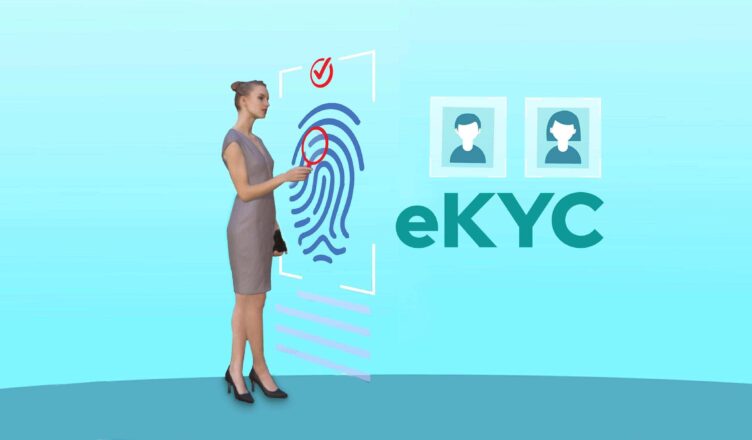Today, the process of opening a bank account has become increasingly streamlined and convenient. One of the most significant advancements in this area is the introduction of eKYC (electronic Know Your Customer). eKYC simplifies and accelerates the customer verification process, making it easier for individuals to open bank accounts online. Let’s explore the benefits of eKYC for online bank account opening and explain how it works, highlighting its impact on both customers and financial institutions.
What is eKYC?
eKYC, or electronic Know Your Customer, is a digital process for verifying customers’ identities. Traditional KYC procedures often involve physical paperwork, in-person visits, and manual verification, which can be time-consuming and cumbersome. eKYC replaces these traditional methods with digital solutions, enabling faster and more efficient customer onboarding.
How does eKYC work?
The eKYC process involves several key steps:
-
Digital Documentation: Customers upload scanned copies of identity and address proof documents, such as a passport, driver’s licence, or utility bills.
-
Biometric Verification: Some eKYC processes include biometric verification, where customers use facial recognition or fingerprint scanning to confirm their identity.
-
Instant Validation: The uploaded documents and biometric data are validated instantly using advanced technology, eliminating the need for manual checks.
-
Secure Data Handling: All data is encrypted and securely stored, ensuring privacy and compliance with regulatory requirements.
Benefits of eKYC for Customers
-
Convenience: One of the most significant benefits of eKYC is convenience. Customers can complete the entire verification process from the comfort of their homes. Visiting a bank branch or submitting physical documents is unnecessary, making the process quick and hassle-free.
-
Speed: eKYC significantly reduces the time required to open a bank account. Traditional KYC processes can take several days or even weeks. In contrast, eKYC allows for instant verification, enabling customers to open an account within minutes.
-
Accessibility: eKYC makes banking services more accessible, particularly for individuals in remote or underserved areas. By eliminating the need for physical presence, eKYC ensures everyone can access banking services, regardless of location.
-
Enhanced Security: eKYC processes often include advanced security measures such as biometric verification and encryption. These measures protect customer data and reduce the risk of identity theft and fraud.
-
Eco-Friendly: By eliminating the need for physical paperwork, eKYC contributes to environmental sustainability. Reducing paper usage helps lower the banking sector’s carbon footprint.
Benefits of eKYC for Financial Institutions
-
Cost Efficiency: eKYC reduces operational costs for banks by minimising the need for manual processing and physical storage of documents. Automated verification processes are more cost-effective and efficient.
-
Improved Customer Experience: A seamless and quick onboarding process enhances the customer experience. Satisfied customers are more likely to remain loyal and recommend the bank’s services to others.
-
Regulatory Compliance: eKYC ensures compliance with regulatory requirements by maintaining accurate and up-to-date records of customer identities. This helps banks avoid penalties and maintain their reputation.
-
Fraud Prevention: Advanced technologies used in eKYC, such as biometric verification and data encryption, help prevent fraud and unauthorised access, enhancing the banking system’s overall security.
-
Scalability: eKYC processes are easily scalable, allowing banks to handle large volumes of new account openings without compromising on speed or accuracy. This is particularly beneficial during periods of high demand.
Role of IFSC in Online Banking
The IFSC (Indian Financial System Code) is a unique code used to identify bank branches in India. It is crucial in online banking transactions, including fund transfers and eKYC processes. Here’s how IFSC enhances online banking:
-
Streamlined Transactions: IFSC ensures that online transactions are routed to the correct bank branches, streamlining the process and reducing the risk of errors.
-
Verification: During the eKYC process, the IFSC code helps verify the authenticity of bank branches. This adds an extra layer of security to the verification process.
-
Efficiency: By using IFSC, banks can quickly and accurately process online transactions and eKYC requests. This enhances the efficiency of online banking services.
Conclusion
eKYC has revolutionised the process of opening a bank account online, offering numerous benefits for both customers and financial institutions. By providing a quick, convenient, and secure way to verify identities, eKYC enhances the overall banking experience. The integration of IFSC codes further streamlines online transactions, ensuring accuracy and efficiency. As technology advances, the future of eKYC looks bright, promising even more innovations and improvements in the banking sector.

